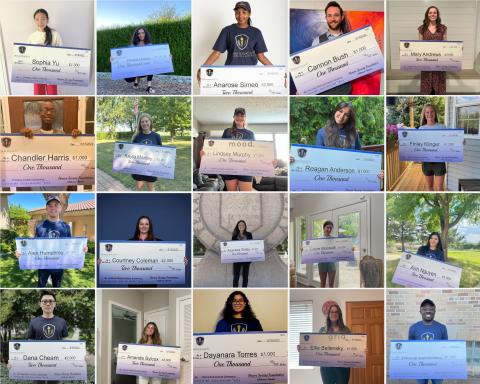Curriculum Vitae vs. Resume: What's The Big Difference?
Oct 01,2020
Congratulations! You're preparing to enter the job market. Graduation day is on the horizon and it's time to land your dream job.
First, you need to showcase yourself and your skills in the best light. This is usually done with a resume or CV (curriculum vitae). But, what's the difference between the two, and which one puts you in the best position for success?
Both CVs and resumes are essential tools for advancing your career. One outlines your academic achievements while the other is geared more toward your skills and job compatibility.
Let's look more closely at a curriculum vitae vs resume, how to write each of them, and when to use them.
Curriculum Vitae vs. Resume
A curriculum vitae, or CV, highlights your academic achievements and credentials. CVs are generally longer than a resume (two or more pages) but can vary, depending on your level of education and number of degrees.
CVs offer a complete background of your educational career and are often used when applying to colleges or other academic institutes.
A resume, on the other hand, is much shorter (one to two pages) and designed to showcase your qualifications for a specific job. Resumes should be concise and present the information in a clear and direct way. They're meant to catch the attention of prospective employers.
Knowing when to use a curriculum vitae vs resume is all about knowing your audience. What type of position are you applying for and what does the interviewer need to know about you?
Asking these questions will help you make the right choice and land the position you're after.
How and When to Use a CV
Now that you know the key differences between a CV vs resume, let's dive deeper into how to prepare each one and when to use it.
When to Use a Curriculum Vitae
Curriculum vitae translates to "course of life". This, in itself, should give you a pretty good indication that CVs are much longer and more involved than resumes.
CVs are used to apply for grants, scholarships, or positions related to the field of education. They're also commonly used when applying for a doctoral program or high-level research positions.
When applying to a secondary school, applicants have to meet certain educational requirements. You might need specific courses, certifications, or degrees for consideration. A curriculum vitae gives universities and establishments a clear, detailed picture of your educational background.
Students applying for scholarships, grants, or fellowships may also need to meet certain academic requirements to be eligible. A CV helps you organize and present your coursework in a clear and professional way.
How to Create a Curriculum Vitae
Once you've determined that a CV is appropriate for your upcoming application, it's time to create one. Don't be intimidated -- once you understand the layout of a typical CV, you'll be surprised by how easy they are to write.
Your CV should include some of these achievements:
- Presentations or seminars
- Research reports or projects
- Publications
- Academic credentials
A curriculum vitae should be highly-detailed. Try writing your achievements in chronological order to effectively show your educational progression.
There are no specific limits or requirements on the length of your CV. However long it takes to list your academic experience and accomplishments is the right length for your individual CV.
When to Use a Resume
Resumes are one of the most important things you can bring to a job interview (except for a professional and friendly demeanor). A resume outlines your job experience and skills the same way that a CV outlines your academic achievements -- but in a shorter format.
While resumes should still include information about your educational background, the main focus is on your job skills. A resume outlines exactly why and how you're a perfect fit for a specific job.
Most employers work in busy, high-stress environments. They don't have time to read a lengthy CV that outlines your academic achievements in detail. Make your resume concise and to the point.
Remember, you only have one chance to make a good first impression during a job interview.
How to Create a Resume
The trick to writing a quality resume that gets noticed is knowing what to include and what to leave out. With so many strong skills, and achievements, it can be difficult to narrow down the most important line-items.
The best way to decide is by looking at the specific job you want. What skills and experiences show that you're a good fit for this particular position?
For example, if you're applying as a journalist, mentioning that you were the editor of your college's newspaper would be helpful. On the other hand, your experience as a waitress or babysitter might not be applicable.
Other important things to include in your resume are:
- Job skills
- Work experience
- Highest level of education
Think of your resume as being achievement-based. It should also be a summary of your skills rather than a lengthy explanation.
You want your resume to stand-out at first glance. List your strongest skills and attributes at the top.
Information to Include in Both a CV and Resume
Although CVs and resumes each serve their own purpose, some information is required for both. Basic things like your full name and contact information are musts and should be near the top of both documents.
Both resumes and CVs include information about your education and work history. The difference being that CVs go more in-depth on academics whereas resumes expand on your work history and job skills.
Both documents can include awards and special recognitions. These speak to your professionalism, work ethic, and dedication.
Regardless of whether you're using a CV vs resume, both documents should be polished, neat, and error-free.
Put Your Best Foot Forward with a CV or Resume
Whether you're pursuing a new job or the next level of education, you need a CV or resume to outline your achievements and credentials.
The position you're applying for will determine if you use a curriculum vitae vs resume.
Now that you know the purpose of each, you can start organizing your skills and accomplishments.
Looking for more leadership opportunities or ways to expand your academic and professional career? Learn more here about what Honor Society can do for you.





